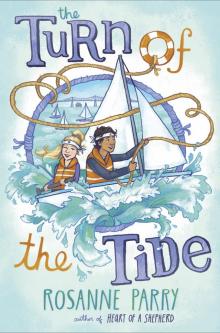- Home
- Rosanne Parry
Second Fiddle
Second Fiddle Read online
Also by Rosanne Parry
Heart of a Shepherd
This is a work of fiction. All incidents and dialogue, and all characters with the exception of some well-known historical and public figures, are products of the author’s imagination and are not to be construed as real. Where real-life historical or public figures appear, the situations, incidents, and dialogues concerning those persons are fictional and are not intended to depict actual events or to change the fictional nature of the work. In all other respects, any resemblance to persons living or dead is entirely coincidental.
Text copyright © 2011 by Rosanne Parry
Map copyright © 2011 by Luiz Vilela
All rights reserved. Published in the United States by Random House Children’s Books, a division of Random House, Inc., New York.
Random House and the colophon are registered trademarks of Random House, Inc.
Visit us on the Web! www.randomhouse.com/kids
Educators and librarians, for a variety of teaching tools, visit us at
www.randomhouse.com/teachers
Library of Congress Cataloging-in-Publication Data
Parry, Rosanne.
Second fiddle / Rosanne Parry. – 1st ed.
p. cm.
Summary: Six months after the fall of the Berlin Wall, three eighth-grade girls living on an American military base with their families in Berlin try to save a Russian soldier, who has been beaten and left for dead, by smuggling him to Paris, where they are going to perform in a music competition.
eISBN: 978-0-375-89350-6
[1. Runaways–Fiction. 2. Soldiers–Fiction. 3. Music–Fiction.
4. Paris (France)–History– –1958–Fiction. 5. France–History–1958– –Fiction.
6. Berlin (Germany)–History–1945–1990–Fiction.
7. Germany–History-1945–1990–Fiction.] I. Title.
PZ7.P248Se 2011
[Fic]–dc22
2009033324
Random House Children’s Books supports the First Amendment and celebrates the right to read.
v3.1
For my mother, who taught me to read, and my father, who got
me a violin, and for both of them together, who believed
I could make music on the page and in my life
Contents
Cover
Other Books by This Author
Title Page
Copyright
Dedication
Chapter 1 - Tuesday, May 22, 1990 West Berlin
Chapter 2 - Unter den Linden, East Berlin
Chapter 3 - Under the Railroad Bridge, East Berlin
Chapter 4 - U.S. Army Base, Zehlendorf, West Berlin
Chapter 5 - Wednesday, May 23, 1990 East Berlin
Chapter 6 - The Tiergarten, West Berlin
Chapter 7 - Thursday, May 24, 1990 Downtown West Berlin
Chapter 8 - Friday, May 25, 1990 The Night Train to Paris
Chapter 9 - Saturday, May 26, 1990 The Sorbonne
Chapter 10 - The Latin Quarter
Chapter 11 - Along the Seine
Chapter 12 - Shakespeare and Company
Chapter 13 - The Art Gallery
Chapter 14 - The Café
Chapter 15 - Sunday, May 27, 1990 Shakespeare and Company
Chapter 16 - The Embassy
Chapter 17 - The Embassy
Chapter 18 - The Eiffel Tower
Author’s Note
Acknowledgments
About the Author
we had known it would eventually involve the KGB, the French National Police, and the Supreme Allied Commander in Europe, we would have left that body in the river and called the Polizei like any normal German citizen; but we were Americans and addicted to solving other people’s problems, so naturally, we got involved.
It began like every Tuesday afternoon. All the other kids from the American school on the army base at Zehlendorf went to the gym or the after-school matinee or the Scout meeting at the community center, but Giselle and Vivian and I took the S-Bahn to our music lesson in downtown West Berlin. Ordinarily, as soon as we found seats on the train, Vivian would get out her geometry book and Giselle would disappear under headphones with a new cassette from the latest girl rock star. If she remembered to bring extra headphones, I’d listen along, but usually I worked on writing my own music: minuets for the violin, mostly. Not nearly as hip as “Girls Just Wanna Have Fun,” but I had to start somewhere, and classical music was what I knew. Not that I’d admit this to just anyone, but classical music was what I loved—more than anything.
We were only five days away from the big Solo and Ensemble Contest in Paris. We’d been working on our competition piece, Pachelbel’s Canon, since Christmas. Our music teacher thought we had a shot at first place in the twelve-to-fourteen-year-olds group, and Giselle’s dad, General Johnson, had bragged to the entire brigade that we were going to clean up, so no pressure or anything. Not that I didn’t love winning, but for me the big deal was that it was our first trip to Paris, and it would be our last time ever to perform together as a trio before the army moved Giselle and me back to the States.
So this time, Vivian and Giselle were listening to the Canon together on her Walkman. Vivian closed her eyes and hummed her part, and Giselle ran the fingerings of the tricky section with all the sixteenth notes. A German lady and her kids stared at us like usual. I used to think it was because Giselle was really pretty and kind of hard to miss because she was so tall, but after three years of riding the commuter train, I knew better. I’d never seen a black kid on the train; plenty of Turkish girls, but nobody as dark as Giselle.
We hopped off at the Potsdamer Platz and walked away from the park and museums and into the neighborhood of Kreuzberg, where our music teacher lived. We went right past Checkpoint Charlie—that guardhouse of Communism between the Soviet Union and the West. It was empty and dark as we walked past, abandoned as abruptly as the East Germans had voted out the Communist Party a few months before. The souvenir collectors and reporters had left months ago. Occasionally, we saw a few eager tourists chipping away at the sections of the Wall still standing, but today, nothing.
“So, Jody,” Vivian said, “what do you want to see in Paris?”
“The Eiffel Tower,” I said automatically. I loved tall things: roller coasters, bridges, the Statue of Liberty, the Space Needle. The upside of being a military kid was that you got to see a lot of cool places. The downside was that every time you made a friend, you had to move away.
“The Eiffel Tower? No way!” Giselle called over her shoulder. As usual, she was a half dozen strides ahead. “Everyone sees the Eiffel Tower. Boring! Let’s go to the Racine Club.”
“Where?” I said.
“It’s a fencing school. The best one in all of France. My fencing master trained there, and he said he’d set up some bouts with the kids who are in training. Come on, it’ll be fun!”
I watched one of Giselle’s fencing matches last year. Right away I could see why fencing is not a sport on TV.
“Hello?” Vivian said. “This is Paris we’re talking about—art museums? Ballet? Neither of you wants to go shopping?”
I, captain of the fashion clueless, shrugged.
“Let’s see,” Giselle said, turning to face us and extending both hands to weigh the options. “Shopping for fluffy, fruity-smelling French things or meeting Olympic-level athletes—tough call.”
Giselle put her hands on her hips and looked down at Vivian, which is not hard even for me. Vivian was the size of your average fourth grader. Vivi glared right back, but it didn’t have quite the same punch with her preppy girl clothes and Clark Kent glasses.
“How about this,” I broke in as we rounded the corner and came to our music teacher’s apartment house
. “There’s shopping on the Champs-Élysées, right?”
Vivian nodded and held open the door.
“Then we can go to the Arc de Triomphe at the end of the street—that’s famous and tall, but not so dorky as the Eiffel Tower, okay?”
Giselle nodded and pushed the button for the elevator.
“And Giselle can, umm …”
“Stab anyone who tries to pickpocket us?” Vivian offered.
“Exactly!” I said. “You can stab them fifteen times if you like,” I added, remembering how many touches made a match in fencing.
“Perfect!” Giselle said. “And while I go to jail, you two can go see a nice fluffy French ballet.” She hip-checked Vivian into the elevator as the door slid open and tugged my ponytail as she followed me in.
“I would bring you cake if you were in jail,” I said.
“Yes,” Vivi added. “Chocolate cake with a bomb inside and directions for your escape in secret code!”
Vivian has read way more spy novels than is normal for a girl our age. The elevator stopped on the fourth floor, and we went two doors down and knocked.
“It’s all settled then,” Giselle said. “Herr Müller will be so glad he agreed to chaperone this trip.”
Herr Müller met us at the door and shook our hands, just like he had every Tuesday afternoon since we were ten.
“Guten Tag, Fräulein Field,” he said, and gave my hand a firm shake for three ups and downs.
“Guten Tag, Herr Müller,” I said, just like I had every week. Vivian and Giselle followed me in.
“Fräulein Armstrong, Fräulein Johnson,” he went on, as formal as ever. It was like meeting the division commander. We filed into his apartment looking for the usual chairs and music stands crowded in next to the piano, plus the practice cello Herr Müller let Giselle use so she wouldn’t have to haul her own cello around on the train. Instead, there was a round table with four chairs set for an afternoon tea. The walls were lined with old books; the window was open exactly one inch.
I set down my violin and looked at the girls. They shrugged. I guessed they hadn’t gotten the memo about the tea party, either.
“Are we celebrating something?” I asked. There was a vase with tulips in the middle of the table.
“You ladies have been working so very hard,” Herr Müller said. “Just this one time I will make for you a treat.” He motioned us to sit and poured us all cups of tea.
Herr Müller was bald as an egg. Apparently his hair had all migrated down to form one massive gray eyebrow. I’d never heard him say how old he was, but based on the number of orchestras he had played in or composed for, I’d have guessed he was one hundred and twenty-three. He looked out the window and didn’t take the first sip of tea or even pass around the cake. I waited for him to start, but he looked completely lost in thought. I lifted the cake plate and held it so Vivi could serve herself a slice.
“Ladies, you are technically fine players, each one of you,” Herr Müller said, turning back toward us. “I am very proud of your musical progress.”
Giselle and I traded a look, and Vivian hid a smile behind her long sweep of blond hair. What had gotten into him? It wasn’t like Herr Müller to be all mushy. I kept my mouth shut except for Danke and Bitte. I passed the treats, wondering if tea before international music competitions was one of those customs we hadn’t studied yet in our German language and culture class at school.
“Yes,” Herr Müller went on. “You play with skill and also the warmth of good friendship. The best music comes from the heart in this way.”
Now I was getting worried. Herr Müller was all about technique and precision. He ended every single piece we had ever played with a list of things in need of “development.” Herr Müller stood up and walked to the window. He surveyed the window box with its required planting of red geraniums.
“You have made such progress. I am very proud.”
“Is there something on your mind?” Vivian asked. “You don’t sound like yourself today.”
“I am not myself,” Herr Müller said. “Not myself at all. I’m sorry, I will not be taking you to the Solo and Ensemble Contest this weekend. We will have to cancel our journey to Paris.”
“What?”
“Why?”
“Aren’t we playing well enough?”
“No, it is not you. I need to have surgery. Not to worry. It is only a small operation. Unfortunately, it cannot wait. I am so sorry. I will be in the hospital for the next five days.”
“Oh.” I slumped back in my chair. I’d packed for the trip last week. I’d saved every dime from babysitting the neighbor kids. I’d told my aunt Cassandra from Minnesota that I was going. She had sent me a camera for my birthday so I’d have one in Paris.
Vivian asked Herr Müller the kind of polite questions grown-ups ask about being sick. I didn’t even hear his answers.
So this is it, I thought. We’ll never play together again. Our parents had decided to let us go with only Herr Müller for a chaperone because they had known him for years, but mostly I think they let us do it because they were all so busy, and they hated taking time off work.
At the end of tea, Herr Müller gave us a note to our parents about canceling the contest, letters of reference for our new music teachers, and a big bar of chocolate for each of us. It was the kind we all hated, with the raisins and hazelnuts in it. We walked out to the street, blinking more from shock than from the late-afternoon sunshine.
We shuffled down the street hardly noticing it was a beautiful day. After a dreary, dark winter and an equally dreary, damp spring, it was the warmest day of the year so far. I felt numb. The trip to Paris was the thing I was using to keep from thinking about saying goodbye to Giselle and Vivian when we moved in less than a month—one last trip for just the three of us. Berlin was the longest I’d been stationed anywhere in my whole life. I’d been in the same school for three years. When we drove somewhere on the weekend, some of the streets actually looked familiar. I even had a favorite restaurant down by the lake. We’d gone there to play at the beach and eat dinner two birthdays in a row. And I’d known Giselle and Vivian longer than I’d known anyone except my own brothers.
Vivian trudged along kicking at gravel. “There has to be a way to still go,” she said. “Can’t your parents take us?”
Giselle shook her head. “My dad is hosting that military ball, remember? The last one for American forces stationed in Berlin. It’s such a big deal! That really old chancellor who got the Peace Prize is going to come, and some famous writer, plus officers from the French and British and German armies. Mom has been sweating the details for months. Do you know how many kinds of protocol there are for all those people? Scary.”
“Oh yeah,” Vivi said, “Mom and Dad are going, too. And Mom’s got some other big diplomatic thing this weekend. Something about what to do about all these little countries that are wanting to leave the Soviet Union. It’s crazy. She’s on the phone constantly. She even got this weird new kind of phone that you can carry around in your briefcase.”
They both looked at me.
“Look, Giselle, if your dad’s working, mine is.” My dad was on General Johnson’s staff. “And my mom has been working a ton of extra shifts at the hospital.” I shrugged. “Sorry.”
“We aren’t going to give up, are we?” Giselle said. “Come on! We have to think of something!”
Which is what I imagine officers say when they want their enlisted men to solve whatever the problem is. I started lining up excuses in my head. It’s not like Mom wanted to work the hours of a crazy person, but without her income, we could never afford a good violin and lessons.
“We need gelato!” Giselle commanded. “We can’t possibly think clearly without ice cream.”
“Exactly,” Vivian said, turning right instead of left at the corner. There was a new shop on the other side of the Brandenburg Gate. “If everyone had just sat down for gelato together every afternoon, the Cold War would have been ov
er a decade ago.”
Giselle laughed. “Ice cream—the instrument of world peace! Why else would we have kept Italy around all this time?”
Vivaldi and the Four Seasons, I thought. Rossini, Puccini, and the best violin makers in the entire world! But I didn’t say anything.
We turned north away from the S-Bahn and toward the Reichstag and the center of Berlin. It was hard to believe that only seven months ago this street had run beside the Berlin Wall—a concrete slab twenty feet tall, behind it a no-man’s-land with barbed wire, land mines, and armed guards ready to gun down anyone who tried to cross. Now we could just stroll right through the Brandenburg Gate into East Berlin.
Vivian walked in front, and even though I’d gone into East Berlin once already with my family, Giselle and I hesitated on the western side of the Brandenburg Gate. When your dad was a soldier stationed in Cold War Germany, it wasn’t just a wall to keep Communists from running away from home. It was a barrier between us and the enemy. Except they weren’t the enemy anymore. They were nothing but sad, shabby former Communists in a broken-down city that used to be the glamour capital of Europe: richer than London and wilder than Paris. Giselle looked at me, and I shrugged back, and we both laughed to cover our pause and crossed over into enemy territory.
The area right around the Brandenburg Gate had been cleaned and tidied, for the sake of TV cameras, mostly. Last winter it had seemed like every news station on the planet was covering the New Year’s Eve dance-on-top-of-the-wall party. But the crowds were gone now. Powder gray crumbs of concrete crunched underfoot as we crossed where the Wall had been. Off to the right was a crew of German Army Pioneers testing for land mines. To the left a long line of dump trucks stood waiting for work crews to fill them with concrete and steel.
The East German neighborhood beyond the Brandenburg Gate was full of shuttered buildings and the empty doorways of apartments that belonged to people who had left everything behind for a chance to live in the West. The main signs of life were the street peddlers with their wooden trays full of Communist souvenirs, mostly Soviet army gadgets—insignia, watches, pocketknives, and the like. They were all young, clean-shaven men with cigarettes and tattooed arms.

 The Turn of the Tide
The Turn of the Tide Heart of a Shepherd
Heart of a Shepherd Second Fiddle
Second Fiddle Written in Stone
Written in Stone